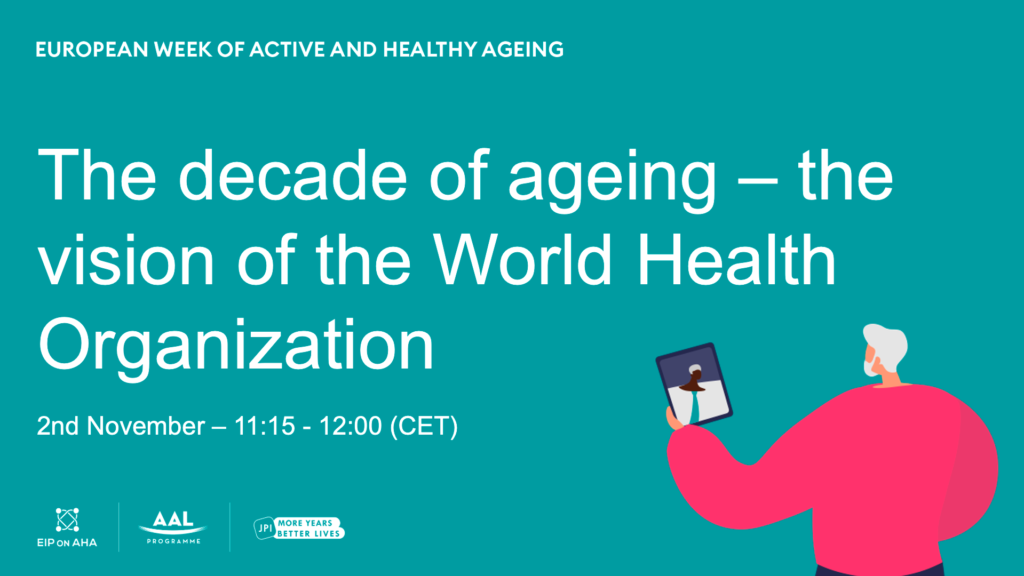JPI MYBL organised three different sessions during the European Week of Active & Healthy Ageing (EWAHA). Read the highlights of these sessions here!

The decade of ageing– the vision of the World Health Organization
This session focused on how the WHO’s Decade of Healthy Ageing aimed to improve the lives of older people, their families, and the communities in which they live. Ritu Sadana gave a presentation highlighting the Decade, the areas of action and the upcoming baseline report. In the report to be launched on December 8th, 2020, the
WHO is expected to share how they are getting ready for the decade with older adults driving the change. Manfred Huber shed light on European implementation plan for the Decade which he considers to be a continuation of the current strategy action plan on ageing. The plan is part of the united action for health which focused on how the Life course approach contributes to healthy ageing. Action areas of the European implementation plan are Age friendly environments, services for older people (esp. gaps) and integrated care. Heidrun Mollenkopf addressed the improvements in the lives of older persons expected from the decade of ageing. She stated that to achieve healthy ageing for all, actions to improve healthy ageing will be needed at multiple levels, in multiple sectors, creating enabling environments, abolishing ageism, promoting health and functional ability and maintaining intrinsic capacity to empower older men and women to life their lives as equal members of society.
Good life, ageing & technology
This session presented the attendees with a common vision of care in times of digitization. It explored what
contributions emerging technologies could bring to achieving better care, both social and healthcare. The session also explored how policy could help to foster this interaction of technology used and achieved resulting in more freedom and more healthier years for all. Introductions were given by Anne Meissner and Paul Higgs and moderated by Peter Allebeck. Two things that became clear during this session namely, the notion that there needed to be a better understanding of who the user of the technology is, as it might not be the older person. The second was that technology was only part of the solution Policy needed to consistently bring together/ align their care strategies and digital strategies to ensure e.g. good service provision.
Vision presented by Anne Meissner ‘the development, implementation and evaluation of technologies in care will be based on the extent to which they contribute to securing good later life as understood by older persons and their caregivers in all their diversity, and in conformity with internationally agreed human rights standards.’
Understanding wellbeing in an ageing society
This session explored how research could improve our understanding of wellbeing as it impacts on people across the expanding lifespan. Ritu Sadana, Head of Unit Ageing and Health at the World Health Organization stated that ‘Healthy Ageing is the process of developing and maintaining the functional ability that enables wellbeing in older age.’ The key is to optimise functional ability especially the ability to meet basic needs because this influences the older persons view on wellbeing. A more person-centred approach is needed. Johanna Cresswell-Smith coordinator of the EMMY project shared that several highquality instruments existed for evaluating mental wellbeing in old age, although none focused on the 80+ age group on wellbeing. She also signalled a general trend towards including mental wellbeing within policy most commonly in relation to health and social welfare. She had three messages for the audience one of them was that regarding mental wellbeing the oldest old age group needs to be included in mental health promotion and research actions, especially in relation to the demographic transition.

